
|
|
|
|
|
Verizon Partner Solutions \
Doing Business \
Local Billing for Verizon East
|
|
Resale Bills for Verizon South
Verizon West
|
|
 |
Summary Billing |
 |
Overview
All Verizon-South Resale accounts are summary billed.
Summary Billing consolidates multiple Business or Residence component accounts into one Master Account Bill. This is done by state for each Reseller based on the type of services resold.
Master Account
The Master Account consolidates the billed charges from the Reseller's component (end user) accounts. Charges incurred by the Reseller doing business with Verizon are the only items placed against the Master Account. The Master Account provides a list of all the associated Component Accounts on the first page of the Other Charges and Credits (OC&C).
Component Account
Component Accounts are the separately billed accounts included on the Summary Bill, which is derived from the Master Account.
Billing Detail
The Summary Bill includes:
- A summary of monthly recurring charges
- OC&C-detail by line number:
- Recurring charges
- Non-recurring charges, including time and materials (if applicable)
- Customer service information (Customer Service Record details) according to existing processing schedules and customer type
- Chargeable local usage summarized by line number. This could include:
- Directory Assistance
- Message Units
- CLASS(SM) Services usage
- Local Optional Calling Plans (OCPs)
- Usage summarized by line number. This could include:
- IntraLATA toll calls carried by Verizon
- Third party charges
- Merchants Agreement calls (BA/AT&T calling card reciprocal agreement)
- Local calls-collect/3rd party/BA IQ card
Advance Billing
Advance Billing items are billed one month in advance from the date of the bill and extend through the day prior to the next billing date. Examples are:
- Local Service
- Subscriber Line Charge
- E911 Fees
Billing in Arrears
The following items are examples of items billed in arrears from the last bill date through the day before the current bill date:
- Message Units
- Directory Assistance
- Itemized Calls
Billing Dates
All the Reseller's component (end user) accounts within a jurisdiction are billed on the same bill date as the Master Account, regardless of the standard bill period for component accounts.
Summary Bill Transfer
The monthly process of taking the total charge from a component account bill and applying it to the master account bill is called a "Summary Bill Transfer".
When this process is performed it generates a summary bill that includes a list of all the component accounts linked to a specific master account, the total amount from each component account current bill and a grand total summary bill amount.
NOTE: All component accounts are listed, including those with a zero total bill amount.
All component accounts on a specific master account share the same bill period, and the summary bill transfer process is performed each month a few days after component account bill generation.
Bill generation always takes place from 2 to 5 days after the bill period date, and all account activity posted between bill period date and bill generation date is included in the new bill.
When a component account is disconnected a "final" bill is produced at regular bill generation, and the total amount is transferred to the master account during summary bill transfer.
If the disconnect date is prior to the next bill period date and after the last bill generation date, the final bill is generated without any variation beyond the fact that the bill records the disconnect and bills the appropriate fractional charges.
If the disconnect date falls between the bill period date and the bill generation date (account B in the example below), the summary bill transfer takes place immediately and the component account total for the final bill is applied to the current master account bill. However, due to the process of segregating finaled accounts from active accounts on the same master account, the component account bill detail will be absent from the current bill and will appear in the following month's bill.
| Example 1: Summary Bill Transfer |
| Bill period date |
6/8/2000 |
| Bill generation |
6/13/2000 |
| Comp. acct A disconnect |
6/7/2000 |
| Comp. acct B disconnect |
6/10/2000 |
| Comp. acct C disconnect |
6/14/2000 |
| Acct A final bill |
6/2000 |
| Acct A detail final bill |
6/2000 |
| Acct B final bill |
6/2000 |
| Acct B detail final bill |
7/2000 |
| Acct C final bill |
7/2000 |
| Acct C detail final bill |
7/2000 |
|
Paper Bill Suppression
If a summary billed customer does not want to receive a paper bill, an indicator is placed on the master account to suppress the printed or paper version of the summary bill.
Since component accounts are not always summary billed (e.g., a retail end user account), the same indicator can be applied to a component account.
It can therefore happen that a paper bill suppression indicator is incorrectly applied (due to human error) to a component account linked to a summary billed master account. This will have the effect of suppressing the detailed paper bill for that account only.
NOTE: The missing component account plus total amount will still be included in the printed summary bill, and the full detail will still be included in the electronic version of the bill.
If a summary billed customer finds one or more component accounts missing from the detail section of a monthly paper bill, it is because the paper bill suppression indicator has been applied in error to the missing account(s).
On request, a Verizon billing representative will remove the indicator and generate a duplicate printed bill for the component account(s) at no additional charge.
|
 |
 |
 |
Bill Payment |
 |
Due Date
- Bills are due upon receipt and are considered overdue after the due date printed on the bill
- A single payment page for the total amount due on the Master Account allows the customer to make one payment for all accounts within a jurisdiction
- Payments are applied only to the Master Account
Payment Options
The following payment options are available to Resellers:
- Check via U.S. Mail
- Electronic payment
NOTE: Establishing an electronic payment relationship with Verizon Treasury is part of the negotiation process.
Late Payment
Late payment charges will apply to outstanding balances not paid by the due date. Late payment charges are generated at a Master Account level.
|
 |
| back to top |
 |
 |
 |
Billing Media Choices |
 |
Bills in printed format are available at no charge. Resellers
may negotiate to receive bills in an alternative output media
for which additional charges may apply.
Please see Bill Media Options for information on alternative output
media.
|
 |
| back to top |
 |
 |
 |
The Billing Invoice |
 |
All bills and associated media are printed on the same type of form. The payment page is the first page of the bill. Please see the examples below.
NOTE: Codes and rates on the billing examples are for illustrative purposes only.
Figure 1: Master Account
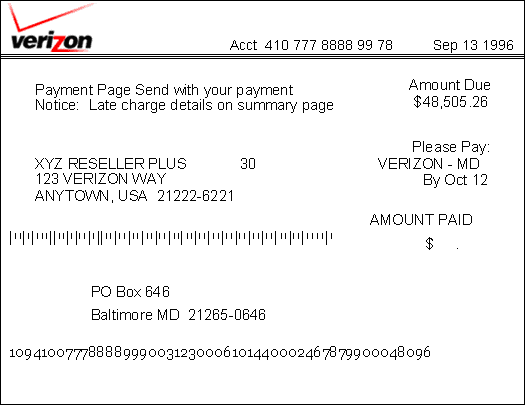
Summary of Verizon Charges
Page 2 of the Summary Bill is the billing detail of Verizon charges:
- Amount of last bill
- Payments and adjustments
- Balance from last bill (if applicable)
- Current Charges for each entity billed
- Verizon Services
- Charges billed for other companies (if applicable)
- Subtotal
- Total Amount
Figure 2: Master Account Summary

Verizon Charges-Component Account Billing Detail
The example below shows Verizon monthly billing detail charges for Component Accounts.
The following charges may also appear on this page:
- Local calls summary
- Direct dialed calls
- Operator handled calls
- Services and equipment information
- Products and Services
Figure 3: Component Account
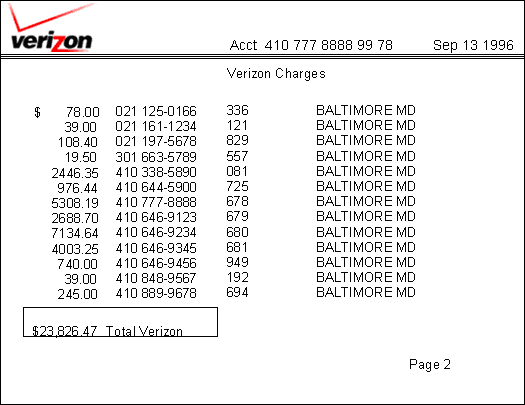
Component Account Mailing Slip
This page is a sample cover page of a bill.
Figure 4: Component Account Cover Page
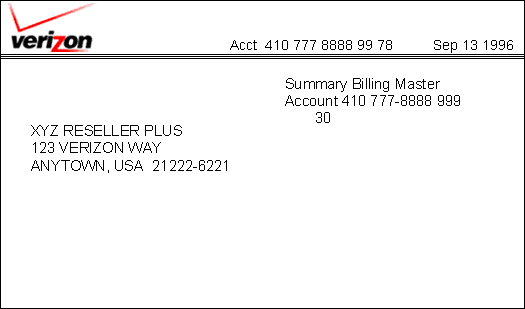
Component Account Summary
The summary page of the component account bill includes:
- Amount past due from last bill
- Summary Bill Transfer (to Master Account)
- Balance from last bill, if appropriate
- Current Charges for the Master Account
- Resale Discount
- Subtotal
- Total Amount due
Figure 5: Component Account Summary
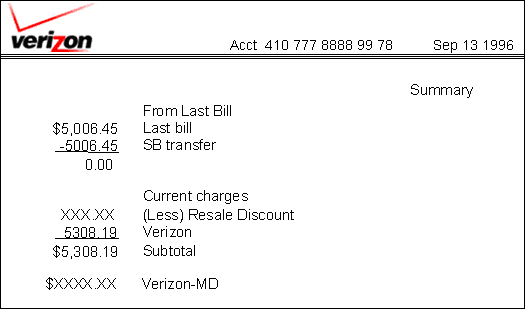
Component Account-Verizon Charge Detail
This page is a summary of Verizon charges:
- Monthly charges-These could also include:
- Local calls summary
- Direct dialed calls
- Operator handled calls
- Services and equipment information
- Products and Services
- Charges incurred from order activity
Figure 6: Verizon Charges
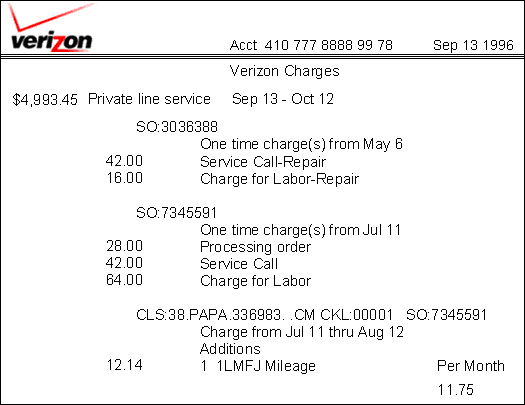
Figure 7: Verizon Charges-Order Activity
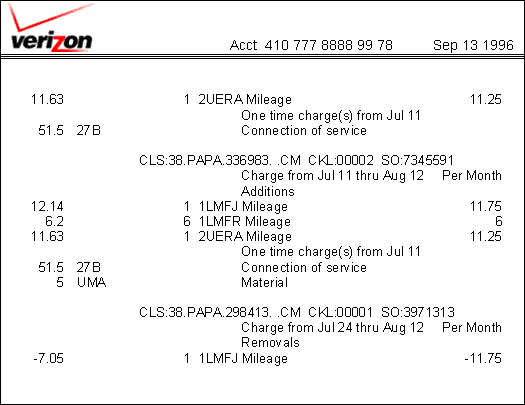
Figure 8: Component Account-Verizon Charge
Detail

Taxes
Resellers are responsible for billing and collecting appropriate taxes (federal, state and local) applicable to resold products and services. Certain taxes contain resale exemptions that permit Verizon to sell services to a Reseller that will be resold to the end-user; therefore, Resellers must provide Verizon with a valid tax exemption form. If the Reseller has questions, it should call the Account Manager.
Billing Inquiry and Support
For all billing inquiries and adjustments, the Reseller should call, write or fax the National Market Center appropriate for the jurisdiction in which it is doing business. All billing inquiries, explanations and adjustments, are handled by National Market Center representatives. Please refer to the Contact Us tab for contact numbers.
Billing Dates for Service
Charges for service begin the day after the order is completed and include the day of disconnection, unless some other date is specified.
NOTE: In New Jersey, charges for service begin the day of connection and do not include the day of disconnection. Fractional charges are based on a 30-day bill cycle.
|
 |
| back to top |
 |
 |
 |
Resale Discount Verification |
 |
In Verizon-South, Resale discounts are applied at component account level once charges are removed which are not subject to the Resale discount. In order for a Reseller to verify the accuracy of its bill, the Reseller must know which retail charges are subject to the resale discount and which are not.
The simplest way to make the calculation is by subtracting the total charges not subject to discount from the Sub Total and multiplying by the remainder by the applicable discount percentage.
| Example 2: Resale Discounts |
| Total charges (Sub-Total): |
$50.00 |
| Total charges not subject to Resale discount: |
$5.00 |
| Total charges subject to Resale discount: |
$45.00 |
| Resale discount percent: |
19.00% |
| Correct discount value: |
$ 8.55 |
|
The applicable Resale discount percentage may be found in the Reseller's contract with Verizon-South. Each contract will also define the retail charges not subject to the Resale discount. A basic list is provided here as a guideline, but the Reseller should check its contract.
If a discrepancy remains even after verifying non-discountable charges in the contract, the Reseller should contact its National Market Center representative.
Charges not subject to Resale discount:
- FCC Subscriber Line Charge
- FCC Non-Presubscribed Line Charges (Primary/Non-Primary)
- FCC Line Port Charge
- Federal Line Cost Charges (Primary/Non-Primary)
- End User Common Line Charge (EUCL)
- End User Port Cost Recovery Charges
- Carrier Selection and Change Charges
- Audiotex Service Charge
- Local Number Portability Surcharge
- Retail prices that are in effect for no more than 90 days
- Charges for services and products provided by Verizon that are not Voice Mail, Telecommunications Services under the Telecommunications Act of 1996 (e.g., Verizon Ancillary Services, Exchange Access Services)
- Any service or charge, which the appropriate state regulatory body, the FCC, or other governmental entity with appropriate jurisdiction determines, is not entitled to a discount under 47 U.S.C. § 251 (c)(4)
|
 |
| back to top |
 |
 |
 |
 |
|
 |
 |
 |
 |
 |
| |
|

